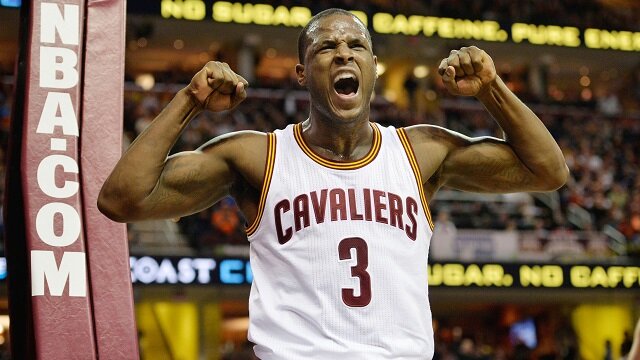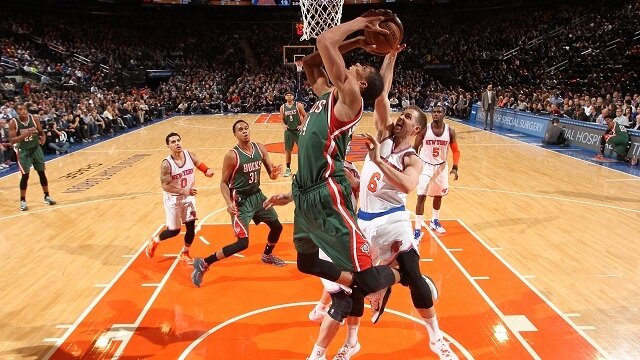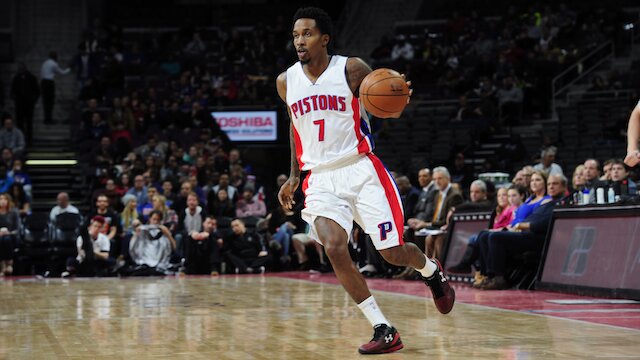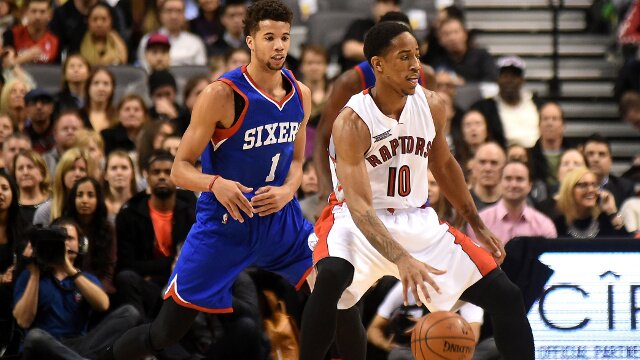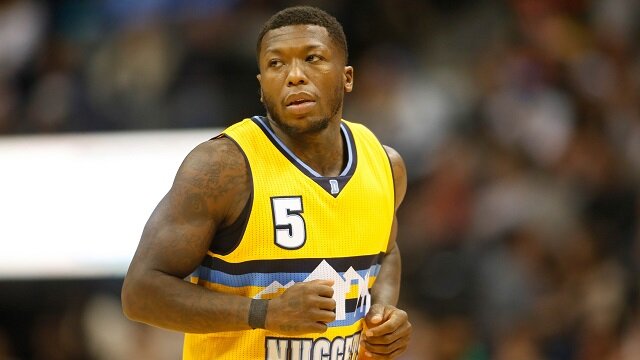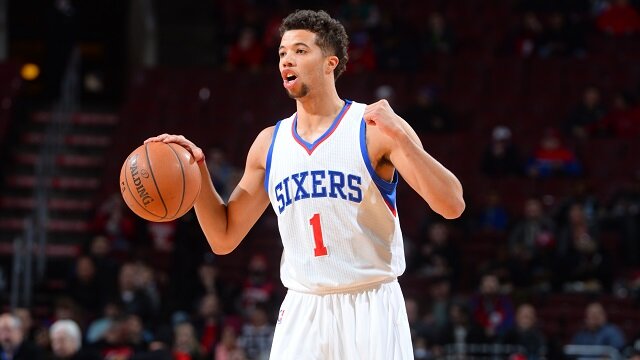Dion Waiters Basically Forced Cleveland Cavaliers to Trade Him
The more and more the revamped Cleveland Cavaliers continued to struggle, the more and more likely it appeared a trade was on the horizon. Riddled with injuries, mired in a losing streak and woefully falling short of preseason expectations, you could just sense a shakeup was en route for the Cavaliers.
Last night, it finally came. Twitter exploded midway through Cleveland’s pathetic loss to the spectacularly terrible Philadelphia 76ers once people started noticing guard Dion Waiters was nowhere to be seen. A last second scratch led everyone to start churning the trade rumors and, sure enough, this is exactly what happened.
Waiters, along with bench residents Alex Kirk and Lou Amundson, had been traded away. While Kirk and Amundson were sent to the New York Knicks, Waiters was on his way to the Oklahoma City Thunder. In return, the Cavaliers received a much-needed wing defender in Iman Shumpert, the always mercurial J.R. Smith and a draft pick.
After this deal literally broke Twitter, many pundits and fans alike began parsing through the details and determining who won or lost. If Shumpert could stay healthy and Smith could be motivated enough to play on a nightly basis, the Cavaliers may have done themselves a solid by turning one rotational player into two and a pick. Will it yank the team out of this slump of near-unwatchable basketball? This remains to be seen.
Lost in all of this, though, is the unceremonious end to the Waiters experiment in Cleveland. There are more than a few people who think the Cavaliers gave up on the guard a bit too early. However, if you take a look at Waiters’ two and a half years in Cleveland, you’d know this is not exactly true. The fact is Waiters caused too many issues with the Cavaliers, and the team had no choice but to get rid of him.
This is in no way an attempt to devalue Waiters from a talent perspective. The former Syracuse Orange standout is incredibly athletic, and if he’s on his game, he’s very difficult for opponents to stop.
The problem, though, was the need to include the word “if” when talking about him. Waiters had plenty of nights where he attacked the basket with a vengeance, cutting the lane aggressively and either taking the ball to the rim or opening up shots for teammates. However, these instances didn’t occur as frequently as the nights in which Waiters did more harm than good.
Waiters was always a bit too trigger happy for the Cavaliers’ liking. Sure, if he was driving, he was a huge threat. But, too often Waiters would be taking ill-advised, long-range jumpers. Most of the time, these shots were pretty well-contested. The amount of times the box score would indicate Waiters’ shot count being higher than the amount of points he poured in was just way too high for anyone’s liking.
It all stemmed back to one of the biggest red flags for the now-former Cavaliers guard: Waiters thought he was a whole lot better than he really was.
There always seemed to be a chip on Waiters’ shoulder when he was on the court. Sometimes, he utilized this, playing aggressive basketball and netting positive results because of it. More often, though, carrying said chip made it appear as though Waiters was trying to prove his worth. This came via three-pointers taken way too early in the shot clock or hogging the ball and shooting despite having a defender’s hand in his face. At the end of the day, the frequency of these occurrences became a huge issue.
Therein lies the biggest frustration with a player like Waiters. It’s remarkable how good he can be when he’s doing what he does best; cutting to the basket. The only thing more remarkable was how content he was to instead settle for contested three-pointers.
Unfortunately for Cleveland, these issues bled into the locker room, as well. Waiters spent the past few years alienating himself with his teammates, proving to be a stick in the mud more often than not. His “I’m better than you are” complex caused a huge rift, especially with star point guard Kyrie Irving.
Word is Waiters was never Irving’s biggest fan. Multiple reports have surfaced over the past couple years regarding Waiters believing he was better than Irving, along with being unhappy about the perception of the Cavaliers front office disagreeing. The two players even had to host a press conference last season in which they attempted to quell the rumors of their conflict, claiming they were “best friends.” It was about as awkward as it sounds.
But, while the two claimed to get along when cameras were in their faces, it certainly didn’t look like they were best buddies on the court. There were more than a few Vines of Waiters standing open, waiving his hands in attempts to get Irving’s attention. The point guard instead chose to do something, anything other than passing it to Waiters.
It wasn’t just teammates Waiters had a problem with, either. Twice in two years now, he’s been pulled from the starting lineup, asked to take on the role of being the team’s primary bench scorer. Unfortunately, this was a role he often seemed too prideful to accept. Waiters may have claimed he was OK being the team’s sixth man, but indications seemed to point towards his unhappiness with this duty.
Waiters’ name had been getting tossed around the trade rumor mill since last season due to the aforementioned issues, but Cleveland never pulled the trigger. You definitely got the sense this year was his last chance to lose his trademark stubbornness. Especially since, if there was anyone who could get the message across to Waiters, surely it would be the team’s biggest offseason acquisition: LeBron James.
It would’ve been impossible for Waiters to look at James and pull the same routine he did against Irving. Waiters is not better than James – or Irving, while we’re being honest – and it’s tough to look at someone who’s been through as much as James has in the league and assume he doesn’t know what he’s talking about. It certainly didn’t seem like a crazy thought to assume James could be the one to finally get the message across to Waiters.
As we all know, this didn’t work out as planned.
New teammates or not, Waiters once again merely sprinkled in nights of competent play, instead once again choosing bad shots over good ones. There were even a couple instances in which an awful shot – and the inevitable miss after it – caused James to sulk on the court. It was as if he was saying “why doesn’t this kid get it?”
It’s no surprise Waiters’ lack of acceptance towards his bench role on a Cavaliers team which was suddenly pursuing championship aspirations was the straw which broke the camel’s back. It didn’t matter who was trying to make the point, Waiters wasn’t listening. He would have those games where he was relentlessly cutting to the hoop, nights where you’d think “this is it; he’s finally turning the corner.” Then, almost on cue, his next game would involve an awful shooting performance thanks to his choosing to stay on the perimeter.
Because of all of this, Waiters woke up this morning as a member of another team. It’s fitting, really, that his last game with Cleveland was a perfect microcosm of his time there. Waiters finished this past Sunday’s game against the Dallas Mavericks with just eight points on 4-14 shooting.
In some sense, you could say the Cavaliers maybe shouldn’t have drafted Waiters in the first place. They paired a ball-dominant guard in Irving with another ball-dominant guard. Both had trouble coming to terms with the idea of not being the main man running the offense, and in the end, there weren’t enough basketballs on the court for the two of them to coexist.
Again, Waiters is hardly untalented. At his best, he has a ton of potential. For all we know, Waiters could end up flourishing in Oklahoma City. Pairing him with players like Kevin Durant and Russell Westbrook certainly doesn’t seem like a bad idea on paper. Of course, this all depends on whether or not he can accept the fact that – spoiler alert – those two players are better than he is.
I don’t think Waiters would’ve ever hit his full potential in Cleveland. He clashed with too many people, and never accepted the roles asked of him. Had he fully embraced the duty of being the Cavaliers’ sixth man, coupled with an increased focus on doing what he does best on the court, things could’ve been different. A consistent Waiters could’ve been a huge edge for Cleveland.
Instead, these are all “what ifs” Cavaliers fans are forced to wonder about. Cleveland gave Waiters enough time to stop being stubborn, stop fighting with his teammates and stop being an offensive liability with constant poor shot selection. He chose not to change any of these issues, and it’s because of this he is no longer with the Cavaliers.
Casey Drottar is a Featured Columnist for www.Rantsports.com. Follow him on Twitter or “Like” him on Facebook
Knicks vs. Bucks: Game Preview, Prediction
Previewing and predicting tomorrow afternoon's game between the New York Knicks and Milwaukee Bucks. Read More
5 Possible Trades for Knicks' Calderon
The New York Knicks are looking to trade Jose Calderon. These five trades would suit the team best if he is in fact dealt. Read More
Raptors' DeMar DeRozan In Great Shape After Injury
Toronto Raptors' DeMar DeRozan has returned to the lineup, but Toronto is still not looking as sharp as early in the season. Read More
Metta World Peace Gives Robinson a Nickname
In his official blog, Metta World Peace discusses Nate Robinson's future in the NBA. Read More
Carter-Williams Trade Rumors Should Be No Surprise
No matter how well he plays, Michael Carter-Williams always seems to be at the center of trade rumors for the 76ers. While many want him in Philadelphia long-term, these rumors should be no surprise. Read More
Hornets' Marvin Williams Has Underperformed
Marvin Williams was a popular signing in the summer, but his numbers haven't matched what was predicted before the season. Read More
Future of Bryant, Lakers Getting Muddier
With the news that Kobe Bryant may not play the whole season, both his and the Los Angeles Lakers' future are in doubt. Find out why here. Read More
Andrew Wiggins In Dunk Contest Will Be Fun
Andrew Wiggins has been rumored to be in the 2015 NBA Dunk Contest and with his athletic abilities will it be fun to watch. Read More
Buyout Market Could Help Heat
Multiple players are already requesting buyouts, and the Miami Heat could become their next destination. Read More
Nate Robinson Joining Clippers Is Not a Bad Idea
Nate Robinson has bounced around during his time in the NBA. It may be a good thing if he bounces over to the Clippers. Read More
Celtics Setting Up For Huge Offseason
With four trades in the last month, the Boston Celtics are clearing up a substantial amount of cap space for next year. They will be expected to make some big moves this offseason. Read More
Bryant, Wade Matchup Must Have A Better Ending
With three matchups likely left in their careers, Dwyane Wade and Kobe Bryant will hopefully close their rivalry out with a bang. Read More
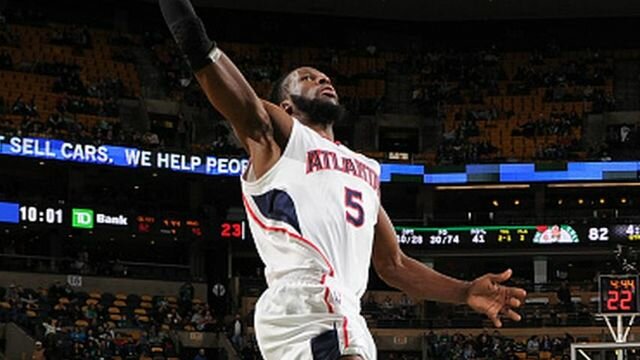




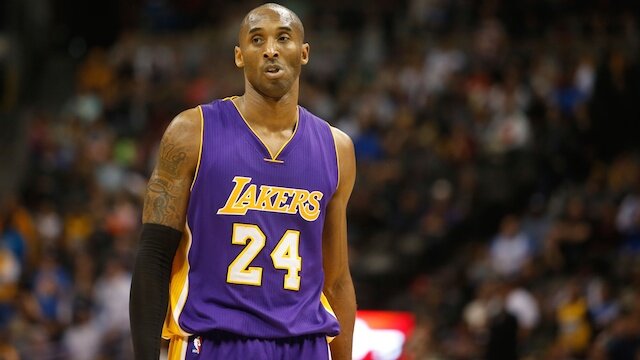



 @cdrottar19
@cdrottar19 